
Gaza border crisis puts Egypt on the spot
by Ian Pannell
Alaa smiled and pulled me by the arm. Firstly he wanted to check my
credentials. "You are a foreign correspondent?"
I nodded and we got the camera ready to record an interview. He shook
his head - not an interview, he just wanted to just tell me something.
In faltering English he declared: "This is the happiest day of my life!"
Audacious act
Hamas militants had just breached the border wall with Egypt and once
again thousands of people were again pouring across no-man's land and in
effect breaching the economic blockade of Gaza, imposed Israel says to
stop militants from firing rockets into its territory.
|
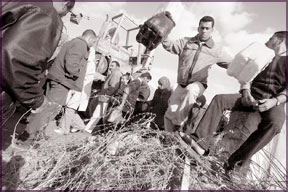
Palestinians cross back into the Gaza Strip, climbing over
barbed wire, on the Egyptian side of the divided border town
of Rafah, 28 January 2008. The number of Palestinians
crossing into Egypt from the Gaza Strip slowed as security
forces tried to seal the border blown up by militants six
days ago, an AFP correspondent reported.
-AFP |
The day had begun with Cairo declaring that the crossing would be
sealed shortly after midday. Thousands of extra security personnel were
brought in to support the poorly-equipped Egyptian border guards. Extra
barbed wire was erected and the troops moved into place, allowing people
to leave, but no-one to enter.
On the Palestinian side, large crowds gathered and people began to
jostle with the Egyptian forces. Rocks were thrown and the police used
water cannons and electric batons.
Gunmen from Hamas responded with automatic weapons - and a large
yellow bulldozer was brought in to once again try to breach the Egyptian
side of the border. It was an audacious act of defiance.
The bulldozer ploughed into the boundary wall again and again, driven
by a masked man, flanked by two others and protected by heavily armed
gunmen.
With sheer brute force and the threat of force the wall fell and the
crowds surged through into Egypt
It was a humiliating defeat for the Egyptian forces who were
outmanoeuvred and outgunned. Its troops had no choice but to stand to
one side and then beat an ignominious retreat.
Sympathy and pressure
Cairo now has two choices. The first is to return with more troops
and try again to close the border. That means not only significantly
increasing its presence but also changing tactics.
Egypt would have to match the force used by the Palestinians this
time, meeting fire with fire. It would be a high-risk strategy, running
the risk of an armed clash with Hamas and even another withdrawal -
either way it would be a public relations disaster for Cairo.
The other option is to sit down with Hamas, the militant Islamic
group that runs Gaza. This is something Egypt has previously ruled out,
but late on Friday the Egyptian President Hosni Mubarak is reported to
have offered to broker talks between Hamas and Fatah, the party of the
Palestinian president.
As long as the Gaza side of this border remains wide open, Hamas have
in effect made themselves an indispensable part of this problem and its
solution.
Egypt has sympathy for the Palestinians but it needs to regain
control of its own territory and is under pressure to do so from Israel
and Washington who fear an open border allows weapons to be easily taken
into Gaza.
Until that happens, the Palestinians of Gaza will continue to move
freely across the border, to shop and meet old friends and family.Some
are even using the opportunity to leave Gaza altogether.
One man told me, "We are in need of help - either with or without the
approval of the International community. "
BBC News, Rafah
Bush addresses US economy fears
President George W Bush has urged Americans to have confidence in
their economy in the long-term, as he gave his final State of the Union
address.
He acknowledged that growth was slowing and that the US faced
"uncertainty".
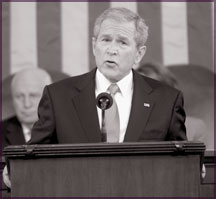
However, a $150bn stimulus plan agreed by Congress and the White
House would help, he said, and must be passed soon. Mr Bush also said
his troop "surge" in Iraq was succeeding after a long and costly war and
that al-Qaeda was "on the run" and would be defeated.
Meanwhile, he called on Iran's leaders to cease their "support for
terror abroad" but said the US respected the country's people.
In response to Mr Bush's address, Democratic Kansas Governor Kathleen
Sebelius expressed a theme of co-operation and bipartisanship.
Democratic House Speaker Nancy Pelosi and Senate Majority Leader
Harry Reid said in a statement that they would "work with the president
- where possible - to bolster the housing market and help Americans keep
their homes".
Speaking on the economy, Mr Bush acknowledged that the US was
"undergoing a period of economic uncertainty", but sought to reassure
the nation.
"At kitchen tables across our country, there is concern about our
economic future," he said.
But, he added: "In the long run, Americans can be confident about our
economic growth."
He also announced a crackdown on congressional earmarks -
politicians' pet projects added to spending bills - and threatened to
veto the next appropriations bill if the number of such measures was not
halved.
Echoing a theme of his 2006 address, when he spoke of the US being
"addicted to oil", Mr Bush spoke about the importance of US energy
independence.
"Our security, our prosperity and our environment all require
reducing our dependence on oil," he said.
In addition, Mr Bush urged Tehran to suspend its nuclear enrichment
programme and "come clean" about its intentions.
He continued: "But above all, know this: America will confront those
who threaten our troops, we will stand by our allies, and we will
protect our vital interests in the Gulf."
American response
On Iraq, Mr Bush acknowledged that the "enemy is still dangerous and
more work remains" to be done. But he praised the work of American and
Iraqi forces in achieving "results few of us could have imagined just
one year ago" and assured Americans that al-Qaeda "will be defeated".
He urged Congress to "meet its responsibilities to these brave men
and women by fully funding our troops". Mr Bush said that as a result of
progress in Iraq and a transition of operations to Iraqi forces, more
than 20,000 troops would be returning to the US in the coming months.
The war in Iraq was a key issue in Mr Bush's 2007 address. He warned
then that failure would have "grievous" results.
During 2007, the US military launched the "surge" strategy - a
build-up of US troop levels in Iraq - and there have been dramatic
improvements in security in many of the most troubled areas, including
much of Baghdad.
But it was also the most deadly year for US forces in Iraq, with some
900 troops killed.
Ahead of the speech, White House spokeswoman Dana Perino told
reporters: "The president thinks his legacy will shake itself out when
people look at the record, and history will tell."
In the Democratic reply to the president's speech, Governor Sebelius
said: "In this time, normally reserved for the partisan response, I hope
to offer you something more: an American response.
"There is a chance, Mr President, in the next 357 days, to get real
results and give the American people renewed optimism that their
challenges are the top priority."
The State of the Union address is expected to be Mr Bush's last
before he leaves office in January 2009, although he does have the right
to deliver one more immediately before he goes. According to Gallup
polls of approval ratings around the time of the State of the Union
addresses, this is the worst year for Mr Bush since his presidency
began.
The BBC's Vincent Dowd in Washington says the simple fact that Mr
Bush is leaving office means he has less than a year to assert his
policies and prove he is no lame duck.
Democratic candidate hopefuls Hillary Clinton and Barack Obama were
in Congress watching the speech.
BBC
Hunt for 'Dr Horror' after police close clinic in kidney swaps raid
India has launched an international hunt for a doctor accused of
running an illegal clinic that duped between 500 and 600 poor labourers
into selling their kidneys and then peddled them to foreign clients.
Police uncovered the clinic last week in an upmarket private house in
Gurgaon, a wealthy satellite town of Delhi that is home to hundreds of
call centres, shopping malls and IT companies. They arrested one doctor,
a driver and three middlemen and rescued five "donors", three of whom
had recently had their kidneys removed and had to be taken to hospital.
They also detained five alleged foreign clients, including two
Americans of Indian origin and three Greek citizens, at a guesthouse
linked to the clinic. However, police say that the alleged mastermind,
identified as Amit Kumar, escaped after being tipped off about the raid
and may have fled overseas using his foreign client network.
"We are not ruling out the possibility that he may have escaped
abroad by using his contacts. However, he will not be able to escape the
legal channels," Mohinder Lal, the Gurgaon police commissioner, said.
"We are not going to let him have an easy run for long. A man accused of
being involved in 500 illegal transplants will not be allowed to go
scot-free and we will track him down soon."
Police, who raided several more of Dr Kumar's properties , have
issued photographs of him, his brother and two other doctors to all
Indian airports. They are also preparing to approach Interpol to obtain
a "red corner" international arrest warrant for Dr Kumar, who is
believed to have one home in Canada. The foreigners were allowed to
leave India last Sunday because there was insufficient evidence against
them, police said.
The alleged kidney racket is one of the biggest to have been
uncovered in India and revived calls for a review of India's strict
transplant laws, which some blame for its flourishing black market in
human organs. Others say that the problem lies with corrupt police and
government officials who have repeatedly turned a blind eye to Dr
Kumar's alleged racket - and many others like it.
Dr Kumar was arrested in 1994 for running a similar clinic in Bombay
under the name Santosh Raut, but disappeared after being freed on bail
and moved his alleged operation to several other cities. Similar cases
were also registered against him in Delhi and the southern state of
Andhra Pradesh in 2000 but he again escaped and set up shop in Gurgaon,
about 15 miles (25km) outside Delhi.
Times on line, UK
Iraq faces another 'pivotal year'
"Iraqi politics," said the spokeswoman at the US embassy in Baghdad,
"is very complex."
by Jonny Dymond
In the middle of an otherwise unremarkable briefing it seemed like
another banal brush off. In fact, it was a profound truth.
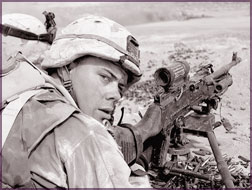
As well as being very complex, Iraqi politics is very important. It
may not seem like that on the Baghdad street.
To most people, finding and keeping a job, getting hold of some
petrol or hoping that the mains power doesn't give out (it does, very
frequently) is a lot more important than what the 250-odd MPs get up to
in the barricaded parliament, deep within the secure Green Zone.
But the fact that people in Baghdad now worry about the abysmal state
of public services and the economy is, bizarrely, a step forward.
This time last year, the concern for most was survival; finding a
neighbourhood where they were safe from death squads and militias;
hoping that they or their children were not going to be caught up in one
of the bombings that brought Baghdad to its knees.
Grim picture
Three factors are credited with bringing the violence down; the
"surge" of an extra 30,000 US troops; the ceasefire announced by Moqtada
Sadr, which reigned in his Mehdi Army; and the Sunni backlash against
the barbarism of al-Qaeda in Iraq, which led to the "Awakening" - a
string of Sunni police forces and intelligence networks that have all
but driven al-Qaeda in Iraq out of the western province of Anbar, and
Baghdad.
It's around this point that the politics becomes important.
The "surge" was never designed to defeat the insurgency; it was
introduced to give Iraq's politicians the breathing space to make some
political progress.
With the New Year has come a rather urgent stocktaking. And, as even
the guardedly optimistic officials admit (there are no unguardedly
optimistic officials anymore) it's a pretty dismal picture so far.
Just one major piece of "reconciliation" legislation has been passed
by the Iraqi parliament - the Accountability and Justice Act, designed
to reverse the catastrophic de-Baathification order issued by the
Coalition Provision Authority in 2004.
Still waiting either to be drafted or presented to parliament is a
law on provincial elections, an electoral law, a law on how oil and gas
should be managed and explored, a law on how oil revenues should be
shared out, and revisions to the constitution to work out how and when
to vote on the status of the northern city of Kirkuk.
Officials and diplomats put most of the blame for the near paralysis
on the office of Prime Minister Nouri Maliki; his critics (and there are
many) lambast him for refusing to work with other members of his
coalition.
Strong message
The Iraqi parliament was never going to be a fast moving beast;
democracy didn't have deep roots in Iraq and besides, the whole system
was in turmoil following the invasion and subsequent insurgency.
But the Americans were taken aback by the lack of political will
within Mr Maliki's circle. In August last year, they thought they had a
deal with the prime minister that he would work more closely with the
presidential council - Jalal Talabani and his two deputies.
But as summer turned to winter, little or no legislative progress was
made. Mr Maliki, says one diplomat, felt that the testimony of General
David Petraeus and Ambassador Ryan Crocker to Congress in September last
year had let him off the hook.
Late in December last year came a spine-stiffening visit from US
Secretary of State Condoleezza Rice. What is diplomatically described as
a strong message was put to Mr Maliki - his coalition partners were only
waiting for a signal from the US to move against him.
Deposing him might only be the least worst option but if the
paralysis continued then something had to give.
Election hopes
In January, more than a year after the US had hoped, the
Accountability and Justice Act passed through the Iraqi parliament.
There is once again talk of Prime Minister Maliki working more closely
with the presidential council - a so-called 3+1 arrangement, and
reaching out further as well.
Everyone from Condoleezza Rice down now acknowledges that the US
timetable was unrealistic. And they are deeply wary of talking up the
current situation.
"There is now," says one senior diplomat highly trained in the art of
not overdoing things "the hint of a possibility of something successful
emerging from this trauma."
But for that to happen there has to be political progress; in
particular, officials are hoping that provincial elections might provide
Iraq's Sunnis with some representation and bring a new generation of
Shia leaders to the fore.
But for elections to happen, the Iraqi parliament must move on laws
defining the provinces' powers and how elections should take place.
"Every year," says the diplomat carefully "we say it is a pivotal
year." He pauses. "But this year really is pivotal."
BBC News, Baghdad
Musharraf's UK visit 'a charm offensive'
Describing his European visit as a "charm offensive", President
Pervez Musharraf has said that Pakistan was the victim of
misunderstandings, misperceptions and distortions and that he was here
to clarify them.
In a series of speeches, briefings and press conferences he has tried
to combat the idea that Pakistan is a source of instability, instead
claiming it is the victim of instability and that the government is
working to address the problems.
Politics has been top of his agenda during his visit to London. Prime
Minister Gordon Brown said "credible" elections were "essential", saying
it was vital that the democratic process remained on track.President
Musharraf confirmed the elections would go ahead and be, in his words,
"free, fair and transparent" with a peaceful transition.
Uncomfortable
But it remains hard to envisage what the political picture will look
like after the upcoming elections.
When questioned by journalists, President Musharraf said he would
work with whatever party won a majority or could organise a coalition -
and with whomever they picked as prime minister.
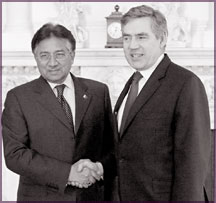
But there is no doubt this could be a very uncomfortable situation
with either the PPP - many of whose members still blame the government
in part for their former leader Benazir Bhutto's death - or with Nawaz
Sharif, whom Musharraf deposed in the 1999 coup that brought him to
power.
Counter-terrorist co-operation was second on the agenda. A team of UK
experts has been looking at what assistance can be provided to Pakistan,
including exchanges on forensic and financial investigation.
Building capability is considered vital by both sides. The
controversy over the escape of alleged terror suspect Rashid Rauf from
Pakistani custody is one sign of the problems.
President Musharraf has outlined a multi-pronged strategy for dealing
with extremism and terrorism which separated out al-Qaeda, the militant
Taleban and the wider problem of extremism, with a different "holistic"
approach to each.
President Musharraf argues that almost all of the suicide bombings in
the country can be traced back to Baitullah Mehsud, whom Pakistan and
the US have said was also responsible for the assassination of Benazir
Bhutto.
Getting to this source was the government's priority. In a briefing
with journalists before his meeting with Mr Brown, President Musharraf
confirmed that earlier in the month he had met America's top two
intelligence officials.
But he said they did not discuss the deployment of US troops within
Pakistan to fight extremists and instead talked simply about improving
intelligence co-operation.
Another crucial area of discussion is regional security, especially
the need for co-operation over Afghanistan where British troops are
fighting the Taliban.
President Musharraf on Friday called for more troops in Afghanistan
to stabilise the situation and said that Pakistan had built more posts,
imposed a curfew and selectively mined the border to prevent
cross-border activity.
BBC
Mom goes on trial in baby's microwave death
Jury selection began last Monday in the trial of a woman accused of
killing her 1-month-old daughter by burning the child in a microwave
oven.
|
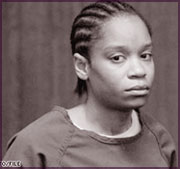
China Arnold could face the death penalty if a jury finds
she deliberately killed her baby in a microwave oven. |
If convicted of aggravated murder, China Arnold, 27, could face the
death penalty. Investigators believe Arnold killed 1-month-old Paris
Talley by putting her in a microwave at her home. Arnold's attorneys
argue she had nothing to do with the baby's death in 2005.
Coroner's officials have said the baby suffered high-heat internal
injuries and had no external burns. They have ruled out scalding water,
open flame or other possible causes of death that could have damaged the
skin.
Defense attorney Jon Paul Rion has said Arnold had nothing to do with
her daughter's death and was stunned when investigators told her that a
microwave might have been involved. Arnold took the baby to the hospital
after finding her unconscious and does not know how she died, Rion said.
During a pretrial hearing in July, police Detective Michael Galbraith
said Arnold told him she arrived home in the early morning hours after
drinking, fell asleep and was awakened at 2:30 a.m. by the baby's
crying.
She said she warmed a bottle in the microwave oven, tried to give it
to the baby, changed the child's diaper and then fell asleep on the
couch with the baby on her chest. Arnold said she and her children were
the only ones in the apartment until her boyfriend arrived several hours
later and noticed something was wrong with the baby.
Galbraith said Arnold told him: "If I hadn't gotten so drunk, I guess
my baby wouldn't have died."
When cross-examined by Rion, Galbraith acknowledged that Arnold told
him she did not know how the baby suffered the burns and that she had
nothing to do with it that she could recall.
Earlier this month, defense witness Robert Belloto, a staff
pharmacist at Good Samaritan Hospital, testified he does not believe it
would have been possible for Arnold to place the baby in the microwave
because the woman was so intoxicated.
Belloto said Arnold told him she had consumed about 40 percent of a
pint of high-proof rum in 90 minutes. But he acknowledged that he had no
other corroboration for her claim.
AP |

